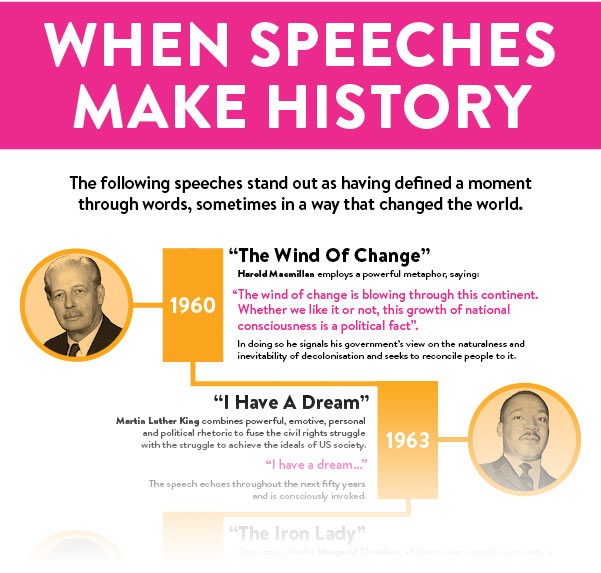)

Why are political speeches so often boring, predictable and unconvincing?
UEA research that charts the history of speechmaking and speechwriting aims to improve understanding of political speech and to restore trust in the art of rhetoric.
Rhetoric is the art of effective or persuasive speaking or writing. But over recent years the growth of sound-bites, spin and talking points has made the general public suspicious of political speeches.
Professor Alan Finlayson argues that we have lost the art of public speaking. Instead of connecting with audiences and speaking to their concerns political speech is often bland and makes people switch off. This is not just limited to political speeches; it is just as important for anyone who needs to make a speech in any sector.
Finlayson's research has looked at how speeches have changed over time, showing how they became mechanistic and far from engaging.
Click on image to see full infographic:

Key to creating great rhetoric is knowing how most people feel about something. In order to explain ourselves, to move people and to be persuasive we have to understand and care about the audience we are talking to. We have to share their concerns and appreciate their ways of thinking. We can then adapt our arguments to the situation.
When people do this well at key moments, people are engaged and motivated and this is good for democracy. The effects of powerful speeches, such as those of Martin Luther King or Barack Obama, prove that the ancient art of rhetoric is still relevant today.
Finlayson argues that in contemporary society people often think of political persuasion as illegitimate. We see it as intruding on our personal thoughts and opinions. A political culture has been created where just making your voice heard is more important than arguing well. How people behave on social media illustrates how making your grievance known - generating 'likes' or retweets – often feels more important than trying to overcome or change the circumstances of that grievance by persuading others to support you.

In his award winning paper, "Rhetoric in Contemporary British Politics", Finlayson concludes that, "political rhetoric in Britain today is not very good at proving, pleasing or persuading." Instead, public speech is often no more than "a way of raising one’s profile in the public sphere and contributing to the creation of a public persona which can be directly parlayed into cash payment for appearances in a variety of media."
Finlayson's research includes an online archive (developed with Judi Atkins of Coventry University) of British Political Speech covering analysis and discussion around rhetoric in political speech.
It provides a focal point for researchers and practitioners interested in the mechanics of good speechwriting. Professor Finlayson plans to engage a range of audiences holding events exploring the art of speechwriting with speechwriters and advisors not only from political parties but also from think-tanks and issue-based political campaigns.
He is also working with colleagues from the Network for Oratory and Politics and the Rhetoric and Politics research group of the Political Studies Association on a series of events which will include working with Parliamentarians.
How the leader speaks was funded by The Leverhulme Trust. Prof. Finlayson is currently applying for funding for the planned events.
The international conference of the Rhetoric Society of Europe will take place at UEA in July 2017, bringing to Norwich rhetoric scholars from all over the world.
Publications/Sources
www.britishpoliticalspeech.org/speech-archive.htm
Proving, pleasing and persuading? The state of the art of rhetoric in contemporary British politics
Why should I vote for you? Reason and Rhetoric in the general election campaign
Proving, Pleasing and Persuading? Rhetoric in Contemporary British Politics, The Political Quarterly, Vol. 85, No.4, October-December 2014.